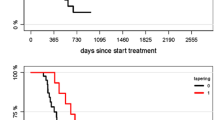Abstract
After withdrawal of bevacizumab in patients with recurrent high-grade glioma, we have observed a rapid tumour re-growth or “rebound” radiographic phenomenon with accelerated clinical decline. We retrospectively reviewed 11 patients treated at the Henry Ford Hermelin Brain Tumor Center with recurrent high-grade glioma who demonstrated a rebound progression pattern after the discontinuation of bevacizumab. The original tumour area-of-enhancement increased by a mean of 158%, when compared to the rebound magnetic resonance imaging. After rebound, no patients (0/8) showed a response to next-line treatments that did not include bevacizumab. The median survival of those re-treated with bevacizumab was 149 and 32 days for those who received other regimens. Abrupt discontinuation of bevacizumab after recurrence often leads to a dramatic rebound phenomenon and rapid clinical decline. Slow tapering of the bevacizumab dose after tumour progression may prevent this from occurring and improve responsiveness to next-line therapies.


Similar content being viewed by others
References
Stupp R, Mason WP, van den Brent MJ, Weller M, Fischer B, Taphoorn MJ, Belanger K, Brandes AA, Marosi C, Bogdahn U, Curschmann J, Janzer R, Ludwin SK, Gorlia T, Allgeier A, Lacombe D, Cairncross JG, Esenhauer E, Mirimanoff R (2005) Radiotherapy plus concomitant and adjuvant temozolomide for glioblastoma. N Engl J Med 352:987–996
Wong ET, Hess KR, Gleason MJ, Jaeckle KA, Prados MD, Levin VA, Yung WK (1999) Outcomes and prognostic factors in recurrent glioma patients enrolled onto phase II clinical trials. J Clin Oncol 17:2572–2578
Ferrara N (2005) VEGF as a therapeutic target in cancer. Oncology 69(Suppl 3):11–16
Pradeep CR, Sunila ES, Kuttan G (2005) Expression of vascular endothelial growth factor (VEGF) and VEGF receptors in tumor angiogenesis and malignancies. Integr Cancer Ther 4:315–321
Kargiotis O, Rao JS, Kyritsis AP (2006) Mechanism of angiogenesis in gliomas. J Neurooncol 78:281–283
Poon RT-P, Fan S-T, Wong J (2001) Clinical implications of circulating angiogenic factors in cancer patients. J Clin Oncol 19:1207–1225
Yang JC, Haworth L, Sherry RM, Hwu P, Schwartzentruber DJ, Topalian SL, Steinberg SM, Chen HX, Rosenberg SA (2003) A randomized trial of bevacizumab, an anti-vascular endothelial growth factor antibody, for metastatic renal cancer. N Engl J Med 349:427–434
Hurwitz H, Fehrenbacker L, Novotny W, Cartwright T, Hainsworth J, Heim W, Berlin J, Baron A, Griffing S, Holmgren E, Ferrara N, Fyfe G, Rogers B, Ross R, Kabbinavar F (2004) Bevacizumab plus irinotecan, fluorouracil and leucovorin for metastatic colorectal cancer. N Engl J Med 350:2335–2342
Sandler A, Gray R, Perry MC, Brahmer J, Schiller JH, Dowlati A, Lilenbaum R, Johnson DH (2006) Paclitaxel-carboplatin alone or with bevacizumab for non-small cell lung cancer. N Engl J Med 355:2542–2550
Miller KD, Wang M, Gralow J, Dickler M, Cobleigh MA, Perez EA, Shenkier TN, Cella D, Davidson NE (2007) Paclitaxel plus bevacizumab versus paclitaxel alone for metastatic breast cancer. N Engl J Med 357:2666–2676
Vredenburgh JJ, Desjardins A, Herndon JE, Dowell JM, Reardon DA, Quinn JA, Rich JN, Sathornsumetee S, Gururangan S, Wagner M, Bigner DD, Friedman AH, Friedman HS (2007) Phase II trial of bevacizumab and irinotecan in recurrent malignant glioma. Clin Cancer Res 13:1253–1259
Cloughesy T, Prados M, Wen P, Mikkelsen T, Abrey LE, Schiff D, Yung WK, Maoxia Z, Dimery I, Friedman HS (2008) A phase II, randomized, non-comparative clinical trial of the effect of bevacizumab alone or in combination with irinotecan on 6-month progression free survival in recurrent, treatment-refractory glioblastoma. J Clin Oncol, ASCO Annual meeting proceedings (Post-meeting edn), vol 26, no 15S (May 20 Suppl), 2010b
Zuniga RM, Torcuator R, Jain R, Anderson J, Doyle T, Ellika S, Schultz L, Mikkelsen T (2009) Efficacy, safety and patterns of response and recurrence in patients with recurrent high-grade gliomas treated with bevacizumab plus irinotecan. J Neurooncol 91:329–336
Norden AD, Young GS, Setayesh K, Muzikansky A, Klufas R, Ross GL, Ciampa AS, Ebbeling LG, Levy B, Drappatz J, Kesari S, Wen PY (2008) Bevacizumab for recurrent malignant gliomas: efficacy, toxicity, and patterns of recurrence. Neurology 70:779–787
Torcuator R, Zuniga RM, Doyle T, Anderson J, Mikkelsen T et al (2008) Salvage concurrent chemotherapy with bevacizumab for recurrent malignant gliomas previously treated with bevacizumab and irinotecan. Neuro-oncology 10(5):829. doi:10.1215/15228517-2008-051 (abstract)
Mancuso MR, Davis R, Norberg SM, O’Brien S, Sennino B, Nakahara T, Yao V, Inai T, Brooks P, Freimark B, Shalinsky DR, Hu-Lowe D, McDonald DM (2006) Rapid vascular regrowth in tumors after reversal of VEGF inhibition. J Clin Invest 116:2610–2621
MacDonald DR, Cascino TL, Schold SC Jr, Cairncross JG (1990) Response criteria for phase II studies of supratentorial malignant glioma. J Clin Oncol 8:1277–1280
Cacheux W, Boisserie T, Staudacher L, Vignaux O, Dousset B, Soubrane O, Terris B, Mateus C, Chaussade S, Goldwasser F (2008) Reversible tumor growth acceleration following bevacizumab interruption in metastatic colorectal cancer patients scheduled for surgery. Ann Oncol 19:1651–1661
Matsumoto Y, Freund F, Peiretti E, Cooney MJ, Ferrara D, Yannuzzi LA (2007) Rebound macular edema following bevacizumab (avastin) therapy for retinal venous occlusive disease. Retina 27:426–431
Ananthnarayan S, Bahng J, Roring J, Nghiemphu P, Lai A, Cloughesy T, Pope W (2008) Time course of imaging changes of GBM during extended bevacizumab treatment. J Neuro-oncol 88:339–347
Author information
Authors and Affiliations
Corresponding author
Rights and permissions
About this article
Cite this article
Zuniga, R.M., Torcuator, R., Jain, R. et al. Rebound tumour progression after the cessation of bevacizumab therapy in patients with recurrent high-grade glioma. J Neurooncol 99, 237–242 (2010). https://doi.org/10.1007/s11060-010-0121-0
Received:
Accepted:
Published:
Issue Date:
DOI: https://doi.org/10.1007/s11060-010-0121-0




